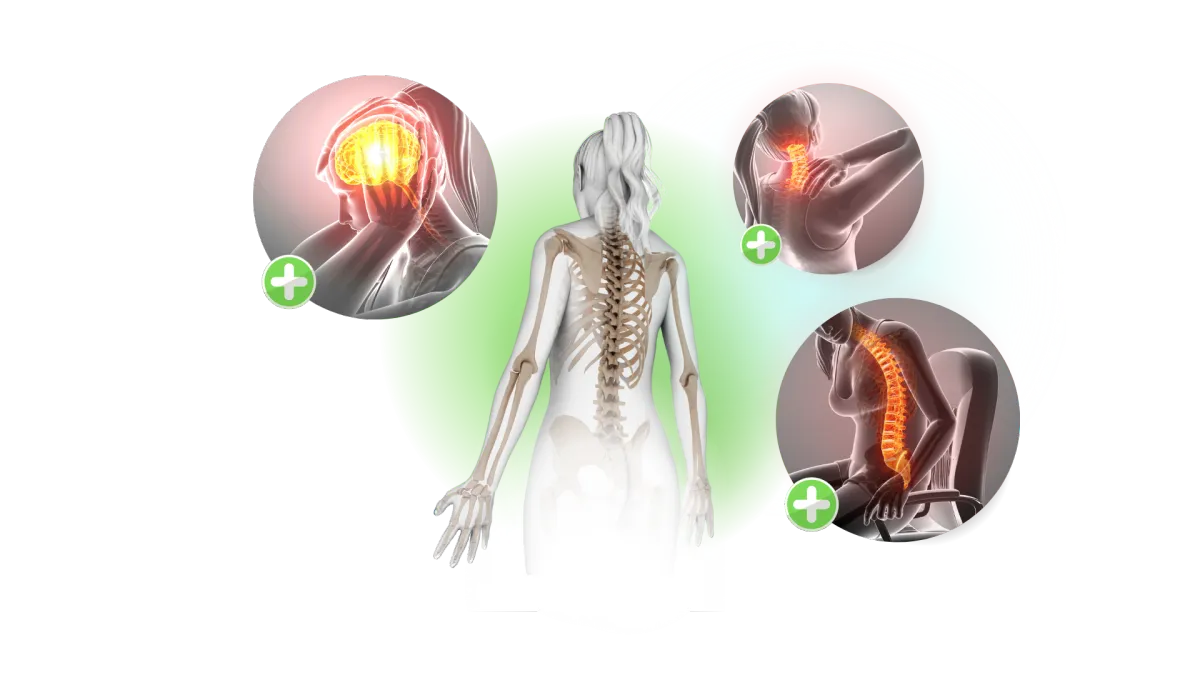Gentle Chiropractic Care in Penrith | Helping You Move Better and Feel More Confident
We help people with persistent back or neck pain move more freely, regain confidence, and get back to doing the things they love — gently, safely, and without forceful “cracking.”
About Your Penrith Chiropractor
At Your Spinal Health in Penrith, we specialise in gentle, low-force chiropractic care.
Our aim is simple: reduce pain, improve movement, and support your body’s natural healing.
Most people follow a short, structured plan over around 12 weeks and notice steady progress.
Everyone’s different, and results always vary — that’s why your care starts with a personalised Spinal Health Assessment.
Peter Bennett – Chiropractor
Registered with the General Chiropractic Council (Reg No: 01124)
Member of the United Chiropractic Association
Your Spinal Health
Registered chiropractic care in Penrith, Cumbria
5 Poets Walk, Penrith CA11 7HJ · 01768 899 036
Your Trusted Spinal Health Experts
At Your Spinal Health, we are passionate about helping you achieve your best health and well-being. We have been serving our community for over 20 years with a commitment to providing the highest quality care.
Combining natural hands-on treatment with our week-on-week progressive system to help symptoms like back pain, neck pain and headaches.

Start NOW. Just 1-click away
We help people feel safer and more confident moving again.
Save On Your Treatment Costs
Each visit is £50.
Save if you choose to pre pay.

Start NOW. Just 1-click away
Our clients tell us they can do more of what they enjoy once their pain is under control. Everyone’s different, and results vary.
Peter Bennett, Chiropractor – Registered with the General Chiropractic Council (Reg. No: 01124)
I'm Peter Bennett!
Hello, I’m Peter Bennett, a chiropractor based in Penrith, Cumbria.
I’ve spent more than 25 years helping people reduce pain, move better, and get more life back into their years.
My approach is gentle — no cracking, no heavy-handed adjustments — just safe, effective techniques that work with your body instead of against it.
Over the years, I’ve learned that the human body is incredibly good at trying to heal itself. My job is simply to understand what it’s trying to do and give it the right support.
People come to see me for all sorts of reasons — stiff backs after gardening, neck pain from long hours at a desk, or just feeling less steady than they used to.
Whatever brings you in, my goal is the same: to help you move more easily and feel more confident doing the things you love.
I believe great healthcare starts with kindness, clear explanations, and respect for each person’s pace. You’ll never be rushed or pressured here — just guided gently toward better movement and lasting results.
When I’m not in clinic, I’m usually outdoors walking in the fells, writing about longevity science, or creating online programs that help people stay active and independent later in life.

Why I Do This
When I first started in chiropractic, I thought the job was all about fixing spines.
But over the years, I’ve realised it’s really about helping people trust their bodies again.
I’ve seen how back pain can slowly chip away at someone’s confidence — the way they move, work, even how they laugh. One day it’s just a niggle, and before long it’s changed how they live. Helping someone turn that around, gently and safely, is still the best part of my week.
I’ve always believed the body isn’t broken — it’s doing its best to protect you. My role is to understand what it’s trying to do and guide it back toward balance. That might mean easing tension in the spine, retraining movement, or simply helping you breathe a little easier.
What keeps me going is seeing people realise they can do more than they thought — walking the fells again, picking up grandchildren, or just waking up without that constant stiffness.
It’s those moments that remind me why I chose this path all those years ago.
My aim has never been just to treat backs — it’s to help people move freely, live fully, and enjoy their years with confidence.
FAQS
What conditions can we help with?
Spinal health care can help a wide range of conditions, including back and neck pain, headaches, sciatica, joint pain, and even issues related to posture. It's not just about addressing the symptoms; it's about improving your overall health and well-being by improving the health of your spine and nervous system. If you have specific concerns or questions about your condition, please don't hesitate to ask for a consultation to discuss how spinal health care can benefit you.
Is spinal health care safe, and are the adjustments painful?
Spinal health care is generally considered safe when performed by trained professionals. The adjustments are typically not painful; in fact, many clients report feeling relief and improved mobility after an adjustment. Our therapists are highly skilled and will use gentle techniques tailored to your individual needs. Your comfort and safety are our top priorities, and we will explain every step of the process to ensure you feel at ease during your sessions.
How many visits will I need to see results?
The number of sessions you'll need depends on various factors, including the nature and severity of your condition, your overall health, and your treatment goals. Some clients experience relief after just a few sessions, while others may require more ongoing care. During your initial Spinal Health Assessment, we will assess your specific situation and provide a personalised treatment plan. Our goal is to provide efficient and effective care, so you can return to a pain-free and healthy lifestyle as soon as possible.
When should I see my doctor instead of a chiropractor?
Most back or neck problems are mechanical and respond well to gentle chiropractic care.
See your GP or call NHS 111 if you have fever, weight loss, cancer history, night sweats, recent trauma, numbness in the saddle area, bladder or bowel changes, severe unrelenting pain, or sudden weakness.
Call 999 immediately if you notice stroke signs —
Face drooping, Arm weakness, Speech changes, Time to call 999 (FAST) — or sudden dizziness, vision loss, or a severe new headache.
If you’re unsure, call us — we’ll help you decide the safest next step.
Latest Articles on Spinal Health

GLP-1 Weight Loss Risks: What You Should Know About Back Pain After Weight Loss
The rise of GLP-1 medications like Ozempic, Wegovy, and Mounjaro has changed the game for weight loss. These powerful drugs, originally developed for type 2 diabetes, are now helping people shed significant amounts of weight—often very quickly.
But many people are now asking an important question:
What are the risks of losing weight too fast? And why are some people experiencing back pain after weight loss?
As a chiropractor and spinal health expert, I’ve started to see a pattern: patients who lose a lot of weight with these medications are coming into the clinic with new or worsened back pain, changes in posture, and a sense of core weakness.
So let’s take a closer look at what’s going on—and what you can do to stay strong and pain-free if you're using (or thinking about using) these medications.
What Are GLP-1 Medications?
GLP-1 receptor agonists (like Ozempic, Wegovy, and Mounjaro) work by:
Suppressing appetite
Slowing stomach emptying
Helping the body regulate blood sugar
The result? Many people lose 10–20% of their body weight in just a few months.
That sounds like a win—and for many people, it is.
But the speed and scale of this weight loss can come with hidden consequences if not managed correctly.
GLP-1 Weight Loss Risks: It’s Not Just Fat You’re Losing
One of the lesser-known GLP-1 weight loss risks is muscle loss.
Research shows that up to 40% of the weight lost on these drugs can come from lean body mass—that includes muscle.
Why does that matter?
Because muscle is essential for spinal health. It stabilises your back, supports your posture, and protects you from injury. When you lose muscle, especially in your core and back, your spine can become more vulnerable.
This helps explain why some people experience back pain after weight loss—even though they’re healthier in other ways.
Why You Might Feel Back Pain After Weight Loss
Here are three common reasons people feel new or worsening back pain after losing weight:
1.Loss of Core Strength
Your abdominal and lower back muscles act like a natural corset for your spine. If you lose too much muscle without strengthening exercises, your spine has less support—and you may feel pain when bending, lifting, or even standing for long periods.
2.Postural Changes
When you lose belly fat or weight from your upper body, your centre of gravity changes. This can affect the natural curves of your spine and strain muscles and joints that were used to supporting a heavier frame.
3.Bone Density Concerns
Rapid weight loss—especially without exercise—can lead to bone thinning. This is especially true in the spine and hips, where less mechanical loading (from both body weight and muscle use) can lead to a loss of bone density over time.
The Good News: You Can Prevent These Problems
Here’s the part that too many people miss:
These issues are avoidable—but only if you take an active role in protecting your spine, muscles, and bones while you’re losing weight.
Here’s how:
✅Eat enough protein
Aim for at least 80–120g of protein per day (depending on your size and activity level) to support muscle retention.
✅Do resistance exercises
Simple bodyweight exercises like squats, wall sits, bridges, and planks can make a huge difference. Twice a week is a great start.
✅Stay mobile
Walking, climbing stairs, and using your body throughout the day helps maintain bone density and joint function.
✅Treat GLP-1 meds as a short-term tool
These drugs are not meant to be used forever. Use the momentum they give you to build new habits—not avoid them.
Final Thoughts
GLP-1 medications can be life-changing, but they’re not a shortcut to long-term health. If you're using these drugs, or thinking about it, take steps now to protect your spine, preserve muscle, and stay strong as you lose weight.
That way, you’ll be lighter—but not weaker. Healthier—but not more fragile. And you’ll be able to move freely and confidently in your new body.
If you're experiencing back pain after weight loss, or want guidance on how to support your spine during your weight loss journey, we’re here to help. Book a consultation at Your Spinal Health, and we’ll help you stay strong from the inside out.
Peter Bennett, DC
Chiropractor and Spinal Health Specialist
Your Spinal Health

Email [email protected]
Your Spinal Health – Chiropractic Care in Penrith, Cumbria
Peter Bennett – Chiropractor (Reg. No: 01124)
Registered with the General Chiropractic Council and Member of the United Chiropractic Association.
This website provides general information only and is not a substitute for personal professional advice. Results vary between individuals.
If you experience severe or worsening symptoms — especially weakness, numbness, or bladder/bowel changes — seek urgent medical attention.
